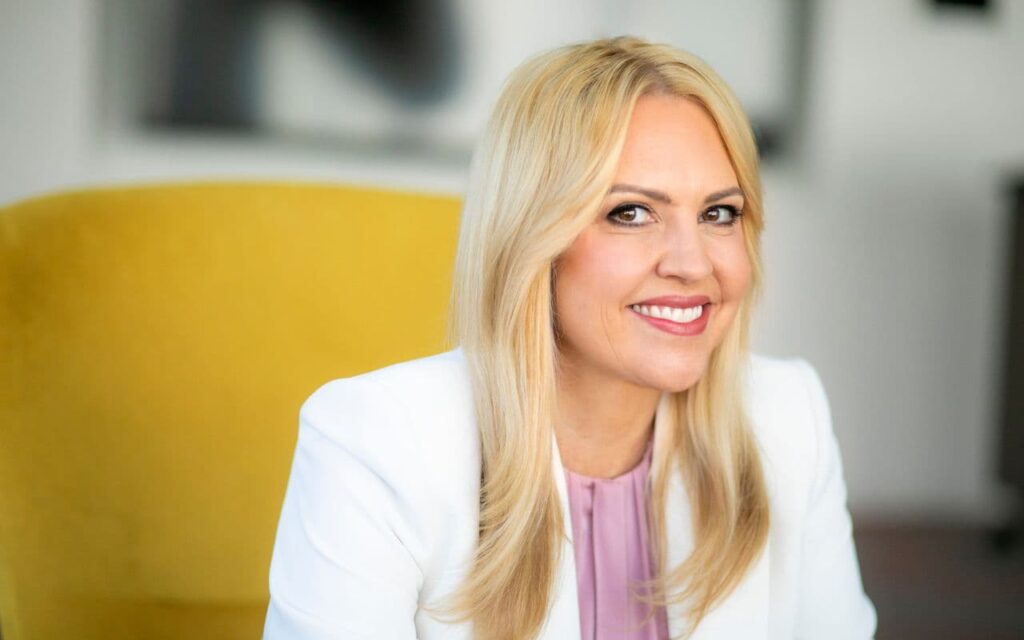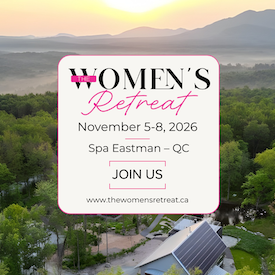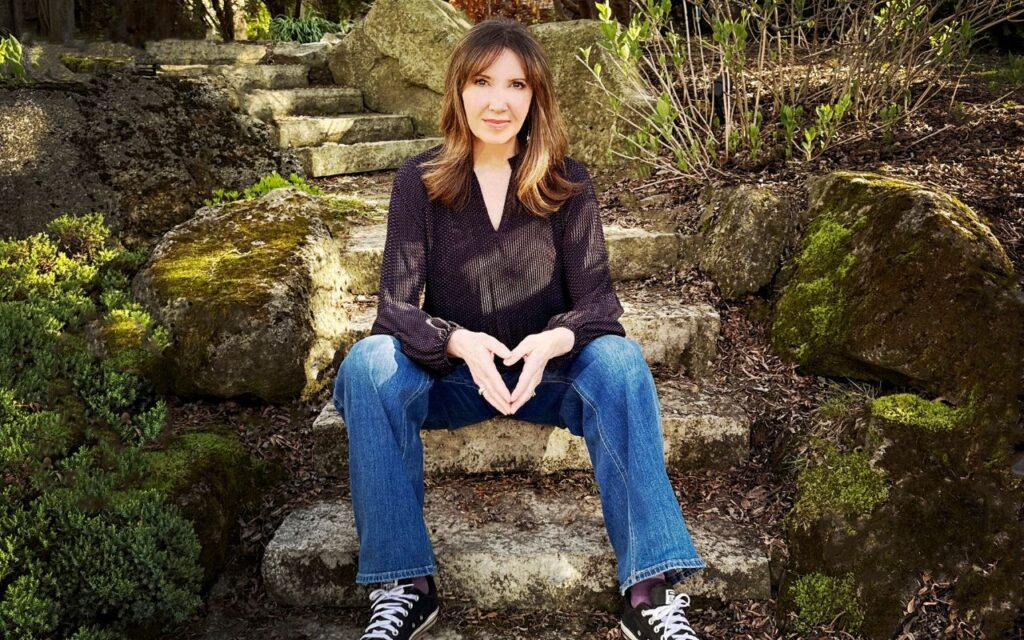
Catherine Clark: We have a lot to talk about, but I thought what we would start with is the fact that you really have built a remarkable career in tech and finance. And frankly, those are industries where women are still underrepresented – even at the highest levels, maybe especially at the highest levels. Can you start our chat today by talking about some of the key decisions or mindset shifts that helped you rise into leadership? And what advice would you give to other aspiring women who want to break similar barriers?
Erin Elofson: I think that I, like many of us, started my career just really excited to get into the workplace. I learned early on that if you had a lot of excitement and passion for something, that was condition number one. People always responded well to the general enthusiasm I had for learning and taking on new challenges.
One of the things – I don’t think I decided this intentionally – but I remember being asked the question, which everyone listening has been asked: What’s your five-year plan? And I kind of always rejected that question, because I found it truly impossible to consider what my five-year plan was. I don’t know what it is now, either. But the one thing I could honestly commit to was that I would keep growing, keep learning, and stay open to whatever that meant.
So, I think a lot of what enabled great opportunities for me was just that strong enthusiasm to do something new, a willingness to learn a lot of different things versus being very focused on rising vertically in any one domain. And then just remaining very open – because the world changes constantly, and opportunities change constantly. I think having that open mindset was really valuable for me in getting exposed to so many different things and different industries, as you said.
Jennifer Stewart: So Erin, you’ve taken on really big challenges without, to your point, always having a clear roadmap or five-year plan. What has given you the courage – and frankly, the confidence – to step into this uncertainty? And how do you stay grounded and focused when the path ahead isn’t really obvious or planned out?
Erin Elofson: Yeah, you know, it’s a great question. I think as women, we always think everyone else is more sure than we are. And so I had to really work hard at internalizing that the path is not clear for anyone. Everybody is uncertain, and the battle is just being able to overcome that uncertainty and keep going.
For me, it was partially just a mindset of saying, okay, it’s okay that I don’t know the answers – most people don’t know the answers. And then realizing that for all of us, sometimes not knowing something is the key to approaching it differently.
Every time I tried to take on a different discipline or a different type of challenge, not knowing everything – not knowing what the solution was – was actually what helped me be really creative. And so I started to learn and believe, even though it’s just as intimidating every single time, that sometimes not knowing the path is actually the best way to get there. Because you don’t feel limited by a very specific way of doing something.
Catherine Clark: So Erin, if I pick up on that – are you honest with others when you don’t know how to walk the path yet? Do you say to those around you, Hey, this is a new adventure for all of us, let’s see what happens, who’s got great ideas? Or do you keep it to yourself because you’re worried that people will judge you?
Erin Elofson: That’s a really good question, because I think it’s easy to sit here with a certain amount of life experience and say, Yeah, you know what? I’m very honest – which I am. But I think the journey of being really candid with people about where I felt lack of clarity, insecurity, or vulnerability is a process.
I look at the role I’m in today, or the place I’m at today, where it’s very visible that I’m doing something in an industry I haven’t exactly been in before, taking on a really big challenge. I feel it’s really critical as a leader to be clear with people that I don’t have the answers, and that I am in a process of experimentation. Not all of those experiments will lead to outcomes that are always perfect.
But I also acknowledge that no matter where you sit in an organization, that’s still scary. And so I’m a lot more open now about sharing when I feel nervous, or when I think, Oh my gosh, I have days where I feel I’ve got this, and days I don’t have this. I think it gives people permission to do the same.
And it gives me permission, very openly, to fail – to not always get it right every single time – because people are very clear that I’m going through a process of experimentation and learning. It gives me license to do that.
Jennifer Stewart: Okay, I love that you use the word failure, because as you know, Erin, so often we’re taught to fear the word failure – and failure itself. But your journey, it seems, you’ve embraced it as part of your growth over the course of your career. How has your definition of failure evolved? And what – I’ll call them failures – what missteps or failures have turned out to be your biggest teachers?
Erin Elofson: Yeah, you know, I think when we start our careers, perhaps the work that we’re doing has more of a clear execution path. And so failure is a lot scarier, because you don’t have some reputation that you walk in with. People are really judging your value based on the thing you did – both the good things and the hard things. And in a way, that’s the toughest time to experience failure.
But what I learned is that, of course – it’s a cliché – but every failure gets you much closer to success. Because you learn: Well, I won’t do it that way again. I won’t say it that way again. I won’t make this sort of uncalculated investment again. And so I started to realize that every failure got me quicker to a path of understanding how to do something successfully.
Now, if you fast-forward to where I’m at today – and many leaders are – you see that the road ahead is always ambiguous. Everything gets less black and white, the expectations are less clear. You have to just understand that there literally isn’t a single answer. So failure is guaranteed, because it’s not like there is a clear, linear path to being successful. There are many different gray areas.
And this sort of tolerance for failure is actually fundamentally important as a more senior leader. Because if you’re not failing, you’re probably not taking bold enough swings. You’re probably not thinking about the strategy in an expansive enough way.
Catherine Clark: But it really takes courage to get to that place – and also, frankly, a sense of resilience. You have to be pretty resilient to pick yourself up and dust yourself off, especially when you’re either moving towards leadership roles or actively leading. Because it’s tough to fail, and it’s tough to do so in a public way. And you know, some really do view failure as undermining yourself. How have you developed the kind of resilience to just say, Okay, that happened, let’s take that one and move on?
Erin Elofson: Well, I think it’s a life question, really. I learned early on that really, really hard days, really hard phases, are almost inevitably followed by the odd good day and the odd good phase. And really great days – amazing days or moments in your career where you feel like you’re really winning – are almost always followed by a dimension of being humbled.
So I think it’s the promise of knowing that nothing is static. Every great leader has had a series of failures. And this belief, again, that failure makes you stronger and more resilient. And this belief that I will always be able to dust myself off. Sometimes it’s harder, sometimes it’s more embarrassing.
I remember – I have so many stories, as we all do, right? We all have so many stories and hard moments. I remember being at a client meeting many years ago, and just right then and there starting to cry. They recognized my weakness in that moment. It was a tough conversation, and I literally just couldn’t contain my emotion – at a client meeting.
And lo and behold, you walk out of that room, and that’s embarrassing. Some of those failures, those moments of weakness, you feel like you won’t recover from – but you do.
So it’s almost in those toughest or most public moments – well, that’s a small example, but I have many – that you realize: Oh, wait a second. I will recover. I will not be fully judged for this single failure, this single moment of vulnerability. In fact, going through that made me feel even stronger, because if that didn’t get me down, then what will?
So resilience is actually built through a series of failures. But it’s also the promise of knowing you will get back up again. You always get back up again. That’s a decision. No one stops you from getting back up again – only you can stop yourself. And by doing that many, many times – dusting yourself off, getting up off the floor – you actually become more resilient. It gets easier to get up. You get up faster. It feels less embarrassing, because you realize this is just part of the human experience.
Jennifer Stewart: Is there a time where you dusted yourself off and got back up again that you’re particularly proud of?
Erin Elofson: I think one of the most relatable moments of failure everyone has in their career – and certainly people with ambition, I’m sure, if you’re listening to this, that’s because you care about your own progress – is that we’ve all gone for jobs we didn’t get. We were all passed over for something along the way.
What I’m proud of, and what I try to instill in others, is that it’s actually in those moments where you’re tested most publicly – because maybe you really felt you were ready for something that wasn’t given to you – that you have to really, really stay positive and stay focused on the contribution you can have with what you’re doing.
Almost every single time, the decision to do that actually accelerates your reputation and gets you closer to the thing you want, because you’re not being evaluated by the what, it’s the how. The how of disappointment is really important, because life’s full of disappointment. Careers are full of things that are not always black and white. It’s never fair, it’s not like that. But your ability to dust yourself off, even if you think maybe you were the best person for something, almost always leads to even better outcomes.
I know there’s this expression – I really can’t think of what it is – but you know, when a door closes, a window opens. I really believe that in a career, every disappointment has some dimension of purpose, especially if you treat it that way. If you say, Okay, this is my moment to stand strong, it almost always leads to something. And then you go, Actually, it’s okay that the other thing didn’t happen. There’s always a path. There are always other paths.
Jennifer Stewart: You know, Erin, for many women, the invisible work continues – that’s the pressures of childcare, often caring for aging parents. You’ve said here today that you are a believer in self-compassion. What does that mean to you, and what would your advice be to women in terms of making that a priority versus an indulgence?
Erin Elofson: I mean, I love this topic. I’m a mother, I have a blended family, three children – two stepchildren – ranging from 10 to 20. So I’m a very active parent, as well as having an active career. Like everybody here, I also have aging parents, so we’re all balancing all of that.
For some people, self-compassion might be about self-care – going to the gym, taking good care of yourself. That is not me. Self-compassion for me is acknowledging that there is no time for me, and I accept that, and I’m okay with that.
The harder thing has been accepting that having an active personal life, being there for people in my family that I value, and being there for my colleagues is a series of trade-offs. Being compassionate or kind to myself is about accepting those trade-offs. It’s about saying: You know what, I am making an active decision to maybe not burn the midnight oil tonight because A) I’m tired, B) my kids need me tonight, C) maybe I just want to watch Netflix because I’m human and I’m tired.
Does that mean I’m not my very best professional self because I’m not putting in three more hours tonight? Yeah. But that’s a trade-off I am consciously willing to make and forgive myself for. The more honest I am about knowing that I can’t be perfected either, the easier it is to choose myself.
There are many times I choose my work, and that trade-off is imperfect. Self-compassion is about accepting that – it’s all about trade-offs. As long as the trade-offs make sense in that moment and I don’t have major regrets on either side, it’s all worth it.
Too often, women feel that if they’re not 100% at something, they’re failing. If I’m not the perfect mom, I’ll miss curriculum nights. Every school has them, right? But when my teenagers need me – because they’re having a rough day – I will never miss that.
It’s all about those trade-offs and just accepting that we have to find the mixture that makes sense for us. That’s been, in a way, my unlock, and I try to share that with people whenever I can. It’s about just accepting that it’s okay to have trade-offs.
Catherine Clark: I just think that’s such a powerful message, and I love how honest you are about leading on your own terms. I think a lot of women feel there is a set way you have to do things, and there’s so much pressure to feel that you’re excellent at everything you do. The comments you’ve made today are quite freeing for many women because they allow them to understand that you do have to make choices – and not feel ashamed of those choices. You’re making them for yourself, for your family, and often for your career. That idea of helping other women learn to lead on their own terms – can you talk about why that’s important to you?
Erin Elofson: I see and feel everything I watch the women I work with experience. I see the stress people face in perhaps trying to build a healthy relationship, trying to get pregnant, stay pregnant, have a child, maintain a career, or rebuild their life – maybe when a parent gets sick. And I can see that it’s not so much the burden of the thing that’s happening to them – it’s this constant pressure to be perfect and to feel like they can’t have it all.
I see the struggle women face, and even though we talk about this struggle all the time, it doesn’t make it any less difficult. So it’s important to me that we have real discussions – the really, really real discussions – about these topics. Because sometimes just exchanging information about the hard truths and the hard trade-offs is, as you said, what gives people levity. It gives them permission to say, I’m leaving work to take my daughter or son to this thing because it’s important to me right now.
I want to give people permission and license to feel less weighed down. I remember how that felt, and I wish someone could have given me some shortcuts. So I’m kind of like, Hey, let me save you a couple of hard knocks and a bunch of guilt. Let me save you years of guilt and tell you a couple of things maybe no one else will say.
So I think it starts with having the hard conversation. Because sometimes, that’s what people need – it’s what I often observe.







